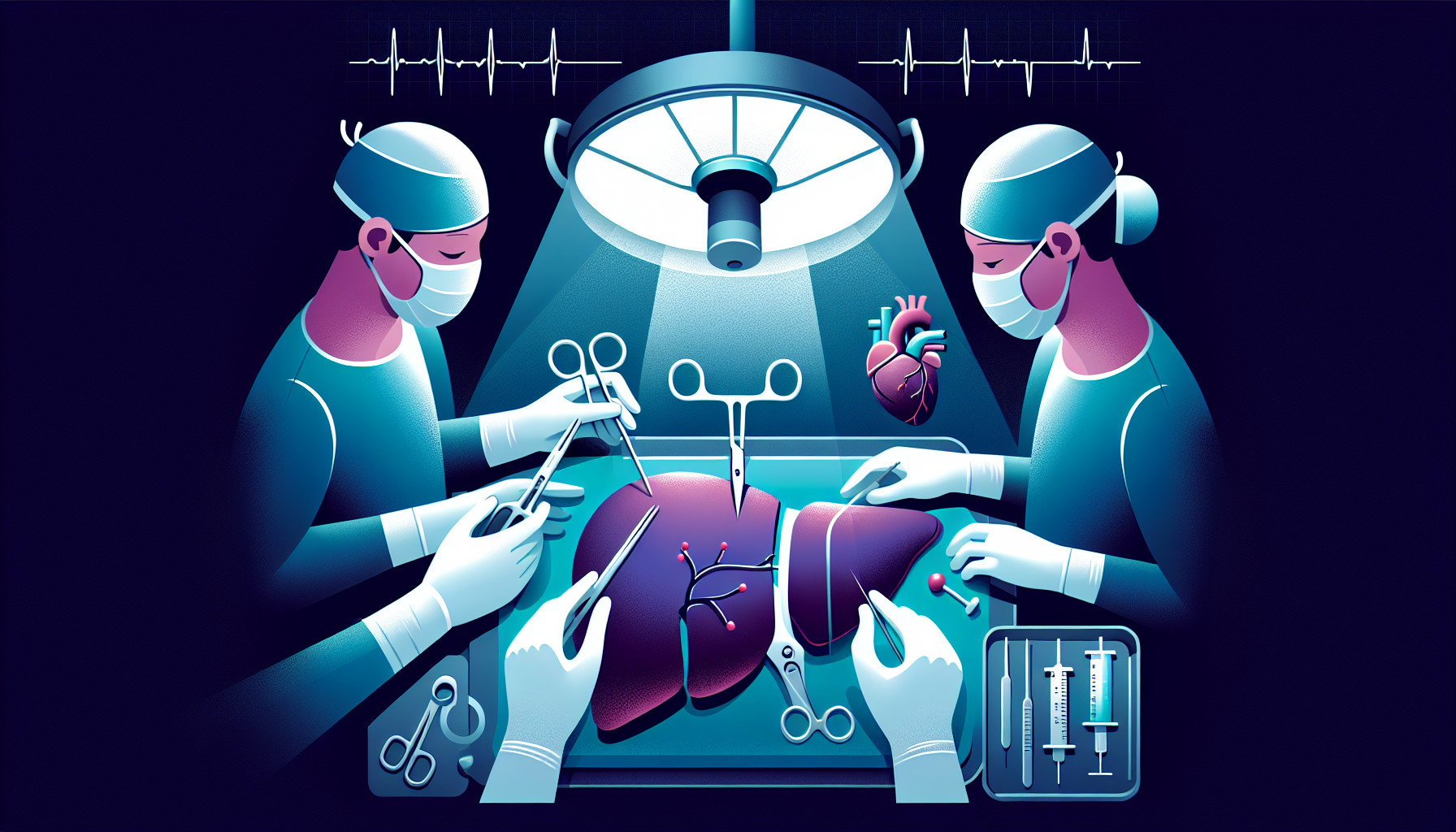Our Summary
This research paper looks at how safe and effective it is to perform liver transplants on patients who have recovered from COVID-19. It focuses on patients who had serious liver disease (cirrhosis) and who received livers from donors who had passed away. The study was carried out from April 2020 to January 2021, during the peak of the COVID-19 pandemic.
The study found that 14 patients with advanced liver disease, who had recovered from COVID-19, received a liver transplant. On average, they had the transplant about 56 days after recovering from COVID-19. Unfortunately, three patients passed away after the transplant. Two of these three patients had been hospitalized and treated for COVID-19 before their transplant. Interestingly, five patients tested positive for COVID-19 after their liver transplant.
In conclusion, the study suggests that liver transplants can be considered for patients who have recovered from COVID-19, especially if their health condition is worsening.
FAQs
- Is it safe to perform liver transplants on patients who have recovered from COVID-19?
- What was the average time between a patient’s recovery from COVID-19 and their liver transplant?
- Did any patients test positive for COVID-19 after their liver transplant?
Doctor’s Tip
However, it is important for patients to be aware of the potential risks involved, such as a higher risk of complications and mortality post-transplant. Patients should discuss these risks with their healthcare provider and carefully weigh the benefits and risks before making a decision about undergoing a liver transplant. It is also important for patients to continue following COVID-19 prevention guidelines, such as wearing masks, practicing social distancing, and getting vaccinated, to reduce the risk of contracting the virus again after the transplant.
Suitable For
Patients who are typically recommended for liver transplant include those with end-stage liver disease, such as cirrhosis or liver failure, due to conditions such as hepatitis B or C, alcoholic liver disease, non-alcoholic fatty liver disease, autoimmune hepatitis, or genetic liver diseases. Patients with liver cancer that has not spread beyond the liver may also be candidates for liver transplant.
It is important for patients to undergo a thorough evaluation by a transplant team to determine if they are suitable candidates for a liver transplant. This evaluation will include assessing the severity of the liver disease, overall health status, and the presence of any other medical conditions that could impact the success of the transplant. Patients must also be willing and able to adhere to the necessary post-transplant care and medications to prevent rejection of the new liver.
In some cases, patients who have recovered from COVID-19 may also be considered for liver transplant, as long as they have fully recovered from the virus and their health condition warrants the need for a transplant. However, as the study mentioned above highlights, there may be some risks associated with performing liver transplants on patients who have recently recovered from COVID-19, and further research is needed to better understand the implications of COVID-19 on liver transplant outcomes.
Timeline
Before liver transplant:
- Patient is diagnosed with advanced liver disease (cirrhosis)
- Patient may experience symptoms such as fatigue, jaundice, swelling in the abdomen, and confusion
- Patient undergoes evaluation to determine if they are a suitable candidate for a liver transplant
- Patient is placed on a waiting list for a donor liver
- Patient may experience worsening health and complications from liver disease while waiting for a transplant
After liver transplant:
- Patient undergoes surgery to receive a new liver from a deceased donor
- Patient is monitored in the hospital for complications and to ensure the new liver is functioning properly
- Patient may experience side effects from the transplant surgery, such as pain, infection, and organ rejection
- Patient requires lifelong medication to prevent rejection of the new liver and to manage other health issues
- Patient undergoes regular follow-up appointments and monitoring to ensure the long-term success of the transplant
Overall, the liver transplant process involves a significant amount of preparation, surgery, and ongoing care to ensure the patient’s health and well-being.
What to Ask Your Doctor
Some questions a patient should ask their doctor about liver transplant include:
- What is the success rate of liver transplants in patients who have recovered from COVID-19?
- What are the potential risks and complications associated with receiving a liver transplant after recovering from COVID-19?
- How long should I wait after recovering from COVID-19 before considering a liver transplant?
- Will my previous COVID-19 infection impact the compatibility of a donor liver for transplant?
- How will my post-transplant care be affected by my previous COVID-19 infection?
- What steps will be taken to prevent the spread of COVID-19 during the transplant procedure and recovery process?
- Are there any specific precautions I should take as a liver transplant recipient who has previously had COVID-19?
- How will my immune system be affected by both the liver transplant and my previous COVID-19 infection?
- Are there any specific medications or treatments I should avoid due to my history of COVID-19 and liver transplant?
- How will my overall prognosis and recovery be affected by having both a liver transplant and previous COVID-19 infection?
Reference
Authors: Eshraghian A, Nikoupour H, Dehghani M, Gholami S, Shamsaeefar A, Kazemi K, Sanaei AK, Taghavi A, Malek-Hosseini SA, Nikeghbalian S. Journal: Exp Clin Transplant. 2022 Oct;20(10):925-929. doi: 10.6002/ect.2022.0228. PMID: 36409052
